Sharing food with strangers is among the oldest human customs. It can serve as an act of kindness, unity, or ritual, and can help us hold on to traditions. In Scott Thybony’s latest Canyon Commentary, he explores the idea of sharing food through the framework of his world travels.
Smoke filtered through the trees far ahead, rising in a thin column above the forest. We were hiking along a glacier-fed river in northern British Columbia, searching for a band of nomadic hunters. The anticipation grew as we approached their camp. Suddenly the woods erupted in chaotic barking as half a dozen dogs gave the alert.
Several Indians greeted us with shy smiles. No one spoke English. They wore carefully-patched clothes slick with animal fat. Slices of mountain sheep, cut to a translucent thinness, were drying on a rack over the fire. The tang of woodsmoke and curing meat permeated the campsite with scents reaching deep into the human past.
One of the women tore off a piece of jerky and handed it to me. While chewing the smoky meat, I realized how the act of sharing food with strangers must be one of our oldest customs. It’s a simple gesture of friendship, and when done in a religious setting it becomes a ritual. I’ve eaten in silence with Benedictine monks in a New Mexico monastery, and deep in the Sahara Desert broke the Ramadan fast with an Egyptian army officer. He shared his meal of canned meat and crackers, which he formally arranged on a blanket spread over the sand.
Food marks the end of important events like funerals and weddings, and it also becomes a way to express appreciation. After helping a rancher brand cattle below the San Francisco Peaks, I filled a paper plate with a couple of cowboy favorites, deep-fried Rocky Mountain oysters and green Jell-O salad. On my first trek into the Grand Canyon backcountry I carried journey bread made from blue corn and juniper ashes. It had been given to me by a Navajo family as we said goodbye after spending a winter together. Earlier one of them pulled a sheep’s head from the coals of a fire and offered me an eyeball, considered a delicacy. I politely turned down his generous offer.
Food can also be a way to hold on to traditions. In Del Rio, Texas, Willie Warrior and I climbed into his pickup and headed to the Mexican border for what he promised was the best barbacoa anywhere. It’s a soft corn taco filled with pit-roasted meat. As we ate, the Black Seminole Indian described their traditional foods. “Armadillo is good eating,” Willie said, “like pork. We still like to eat it when we can get it.”
And food can be an act of kindness. On a Costa Rican river I came down with a high fever. A local family placed me on a bench in the backroom of their dirt-floor house. That night, soaked in sweat, I rolled over and came face-to-face with a huge pig. Delirium must have set in, I thought, until the pig snorted and I realized we were only sharing the same accommodations. As a cure, the women fed me rice with lime juice, one spoonful at a time.
It’s possible, of course, to take food sharing to the extreme. During high school a group of friends and I would take off every free weekend to explore caves in the mountains of West Virginia. Each person would bring a can of food to heat up on the campfire. One night we decided to toss everything together into a single pot, getting a kick out of breaking all the culinary rules. Nobody wanted seconds, but that was beside the point. The sharing of even bad food can be an act of friendship.




